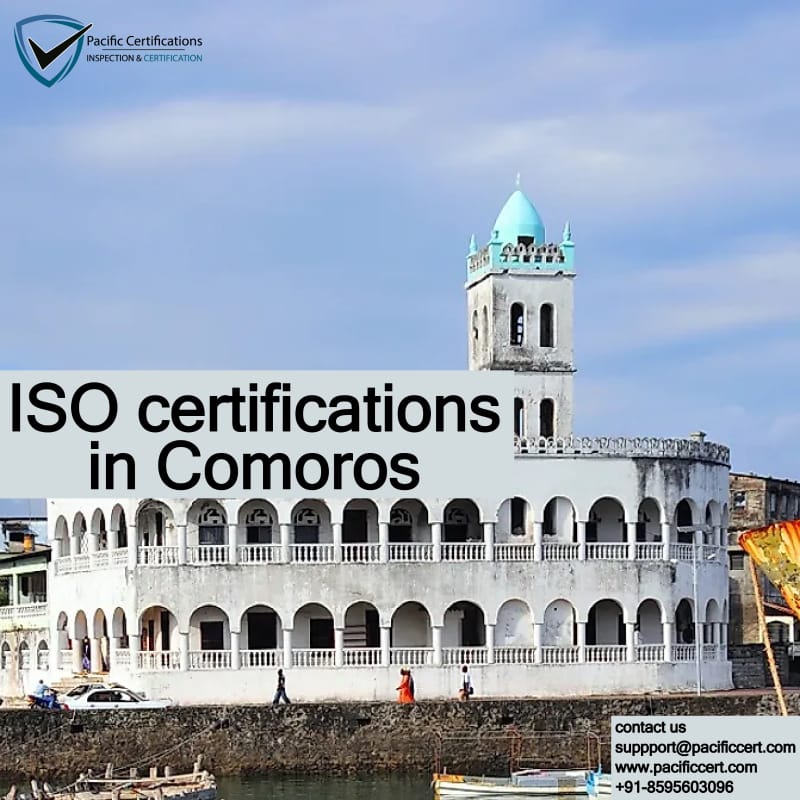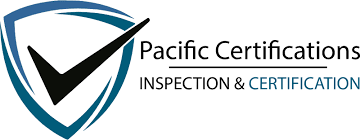ISO Certifications in Comoros, Popular Standards, Requirements and Benefits

Introduction
Achieving ISO certifications in Comoros can significantly enhance an organization's operational efficiency, market credibility, and international compliance. ISO (International Organization for Standardization) standards are globally recognized benchmarks that set out the criteria for various management systems.
These certifications cover a broad spectrum of areas, including quality management, environmental management, information security, and occupational health and safety, among others.
ISO Applicable Standards
Some of the key ISO standards that are applicable and beneficial for organizations in Comoros include:
ISO 9001: Quality Management Systems (QMS)
This standard helps organizations ensure they meet customer and other stakeholder needs within statutory and regulatory requirements related to a product or service. ISO 9001 is the foundation of the ISO 9000 family.
ISO 14001: Environmental Management Systems (EMS)
It provides a framework for companies to protect the environment and respond to changing environmental conditions in balance with socio-economic needs.
ISO 45001: Occupational Health and Safety Management Systems
This standard helps organizations reduce workplace injuries and illnesses, providing safer working conditions.
ISO 27001: Information Security Management Systems (ISMS)
It helps organizations keep information assets secure, protecting the confidentiality, integrity, and availability of information.
ISO 22000: Food Safety Management Systems (FSMS)
This standard helps organizations in the food chain to ensure food safety.
Click here to find out more applicable standards to your industry
Requirements of ISO Certifications in Comoros
The requirements for obtaining ISO certifications in Comoros, as in any other country, hinge upon the specific ISO standard being pursued. However, there are common elements across most ISO standards that organizations need to address to achieve and maintain certification. Let's outline the general requirements for some of the most widely adopted ISO standards, which Pacific Certifications can help organizations in Comoros to meet:
ISO 9001: Quality Management Systems requirements
Leadership Commitment: Top management must demonstrate leadership and commitment to the QMS, ensuring the quality policy and objectives are established and compatible with the strategic direction of the organization.
Customer Focus: An organization must understand and meet customer requirements, needs, and expectations.
Process Approach: Understanding and managing interrelated processes as a system contributes to the organization's effectiveness and efficiency in achieving its intended results.
Risk Management: Identifying, assessing, and addressing risks and opportunities associated with the organization’s context and objectives.
Continuous Improvement: The organization must continually improve the suitability, adequacy, and effectiveness of its QMS.
ISO 14001: Environmental Management Systems requirements
Environmental Policy: Development of an environmental policy that reflects the organization's commitments, including compliance with applicable legal requirements and other requirements, and a commitment to continual improvement.
Planning: Identification of environmental aspects, legal requirements, and other obligations. Setting environmental objectives and planning actions to achieve them.
Operational Control: Implementing controls to manage significant environmental aspects and comply with legal and other requirements.
Performance Evaluation: Monitoring and measuring environmental performance against the policy, objectives, and compliance obligations.
ISO 45001: Occupational Health and Safety Management Systems requirements
Worker Participation: Ensuring the participation and consultation of workers in the development, planning, implementation, and continual improvement of the management system.
Hazard Identification and Risk Assessment: Proactively identifying and assessing hazards to eliminate or control risks to health and safety.
OH&S Objectives and Planning: Establishing objectives and plans to achieve them, including consideration of legal requirements and other obligations.
Emergency Preparedness and Response: Planning for emergency situations and testing and reviewing the planned responses.
ISO 27001: Information Security Management Systems requirements
Context of the Organization: Understanding the organization's internal and external issues, as well as identifying stakeholders and their information security requirements.
Leadership: Establishing an information security policy and assigning roles and responsibilities for information security.
Risk Management: Conducting information security risk assessments and defining risk treatment plans.
Security Controls: Implementing suitable information security controls and reviewing their effectiveness.
How Pacific Certifications Can Assist?
Gap Analysis:
Identifying where your current management system falls short of ISO standards.
Documentation:
Assisting in developing the necessary documentation, including policies, procedures, and records.
Training:
Offering tailored training to ensure your team understands the standards and how to implement them.
Audit Preparation:
Helping prepare for the certification audit by conducting internal audits and addressing any issues.
Certification and Beyond:
Supporting throughout the certification audit and providing ongoing support to ensure continual improvement and compliance.
For organizations in Comoros, navigating the requirements of ISO certifications can be challenging without expert guidance. We at, Pacific Certifications can leverage our expertise and experience to simplify the process, ensuring that your organization not only achieves but also maintains and benefits from ISO certification, aligning with international standards and improving overall performance.
Benefits of ISO Certifications in Comoros
ISO certifications offer a myriad of benefits to organizations in Comoros across various sectors by establishing credibility, enhancing operational efficiency, and opening doors to international markets. The implementation of ISO standards can significantly contribute to an organization's growth and sustainability.
Pacific Certifications can play a pivotal role in guiding organizations through the certification process, ensuring they reap the full benefits of ISO compliance. Here are some of the key benefits of obtaining ISO certifications in Comoros:
1. Increased Marketability
Global Recognition: ISO certifications are recognized worldwide, signaling to international partners, customers, and regulators that your organization adheres to high-quality standards.
Competitive Advantage: Certification can set your organization apart from competitors, making it a preferred choice for customers looking for quality assurance in products and services.
2. Improved Efficiency and Productivity
Process Improvement: ISO standards require organizations to analyze and optimize their processes, which can lead to more efficient resource use and reduction in waste.
Employee Engagement: The standards' focus on involvement and accountability can boost employee morale and productivity by clarifying roles and expectations.
3. Risk Management
Proactive Risk Assessment: ISO standards like ISO 27001 for information security and ISO 45001 for occupational health and safety emphasize identifying and mitigating risks before they can impact the organization.
Legal Compliance: Adherence to ISO standards can help organizations comply with legal and regulatory requirements, reducing the risk of penalties or legal issues.
4. Quality Improvement
Consistency in Products/Services: ISO 9001, in particular, focuses on quality management systems that ensure consistent quality in the delivery of products or services, leading to higher customer satisfaction.
Continuous Improvement: ISO certification is not a one-time achievement but a continuous process that encourages organizations to constantly seek improvements in their operations and outcomes.
5. Environmental and Social Responsibility
Environmental Impact: ISO 14001 helps organizations minimize their environmental footprint, improve waste management, reduce energy consumption, and ensure legal compliance regarding environmental aspects.
Health and Safety: ISO 45001 promotes a safer working environment, helping to reduce workplace accidents and illnesses and demonstrating an organization's commitment to the well-being of its employees.
How Pacific Certifications Can Facilitate These Benefits:
Tailored Guidance: Offering bespoke advice on navigating the certification process efficiently and effectively, considering the unique context of each organization in Comoros.
Expertise: Leveraging deep knowledge of ISO standards to help organizations implement them in a way that maximizes their benefits.
Post-Certification Support: Providing ongoing support to ensure that organizations continue to meet ISO standards and benefit from the continuous improvement ethos they promote.
By partnering with Pacific Certifications, organizations in Comoros can not only achieve ISO certification but can also ensure that the process enhances their operational, environmental, and social performance. This comprehensive approach not only meets the standards' requirements but also supports sustainable business growth and development.
Which industries need ISO Certifications in Comoros?
In Comoros, as in many other countries, ISO certifications are not limited to specific industries but are beneficial across a wide range of sectors. These certifications provide a framework for best practices, ensuring quality, safety, environmental management, information security, and more. Below are some industries in Comoros that can significantly benefit from obtaining ISO certifications, along with how Pacific Certifications can support these industries in achieving and maintaining these standards.
1. Agriculture and Fisheries
Relevant Certifications: ISO 22000 (Food Safety Management), ISO 14001 (Environmental Management).
Benefits: Helps ensure the quality and safety of agricultural and seafood products, and promotes sustainable farming and fishing practices.
2. Tourism and Hospitality
Relevant Certifications: ISO 9001 (Quality Management), ISO 14001, ISO 22000.
Benefits: Enhances customer satisfaction by providing quality services, ensures food safety in hotels and restaurants, and minimizes environmental impact, appealing to eco-conscious travelers.
3. Manufacturing
Relevant Certifications: ISO 9001, ISO 14001, ISO 45001 (Occupational Health and Safety), ISO 27001 (Information Security Management).
Benefits: Improves product quality, ensures a safer workplace, minimizes environmental footprint, and protects sensitive data.
4. Healthcare
Relevant Certifications: ISO 13485 (Medical Devices), ISO 9001, ISO 27001.
Benefits: Ensures the quality and safety of medical devices, improves patient care services, and secures patient data.
5. Education
Relevant Certifications: ISO 21001 (Educational Organizations Management Systems), ISO 9001.
Benefits: Enhances educational service delivery, ensures continual improvement of educational processes, and increases student and stakeholder satisfaction.
6. Information Technology and Telecommunications
Relevant Certifications: ISO 27001, ISO 20000-1 (Service Management).
Benefits: Protects sensitive data, ensures reliable and secure service delivery, and improves customer satisfaction.
7. Government and Public Sector
Relevant Certifications: ISO 9001, ISO 14001, ISO 27001.
Benefits: Improves efficiency and transparency of public services, minimizes environmental impact of government operations, and secures sensitive information.
How we Can Support These Industries?
Customized Solutions:
Offering tailored guidance and support to meet the specific needs of each industry, ensuring that the implementation of ISO standards brings tangible benefits.
Expertise and Experience:
Utilizing in-depth knowledge of various industries to navigate the unique challenges and opportunities of achieving ISO certification in Comoros.
Training and Awareness:
Providing comprehensive training to ensure that all levels of the organization understand the importance of ISO standards and their role in maintaining them.
Continuous Improvement:
Supporting organizations in not just achieving certification but also in maintaining and improving their systems to ensure ongoing compliance and performance enhancement.
Contact Us
We can facilitate the certification process for organizations across these industries in Comoros, helping them to not only meet international standards but also to gain a competitive edge in their respective markets. Through ISO certification, organizations can demonstrate their commitment to quality, safety, environmental stewardship, and customer satisfaction, which are crucial for sustainable growth and success in today's global marketplace.
Pacific Certifications is accredited by ABIS, in case you need support with ISO certification for your business in Comoros, please contact us at [email protected] or +91-8595603096.
Ready to get ISO certified?
Contact Pacific Certifications to begin your certification journey today!
Suggested Certifications –
Read more: Pacific Blogs

